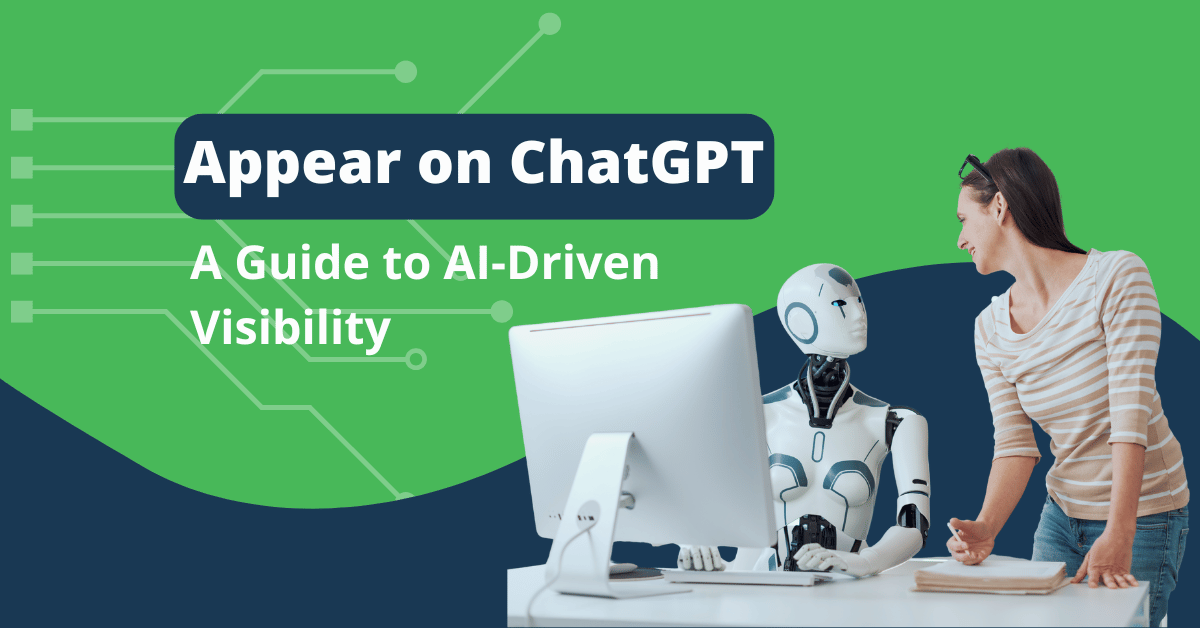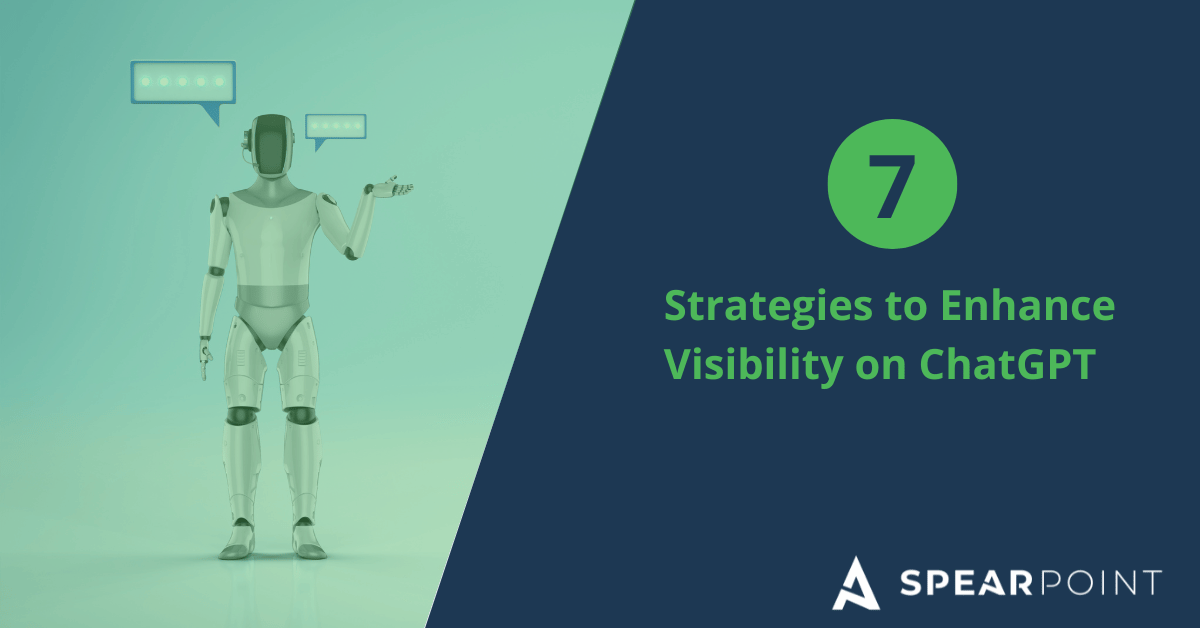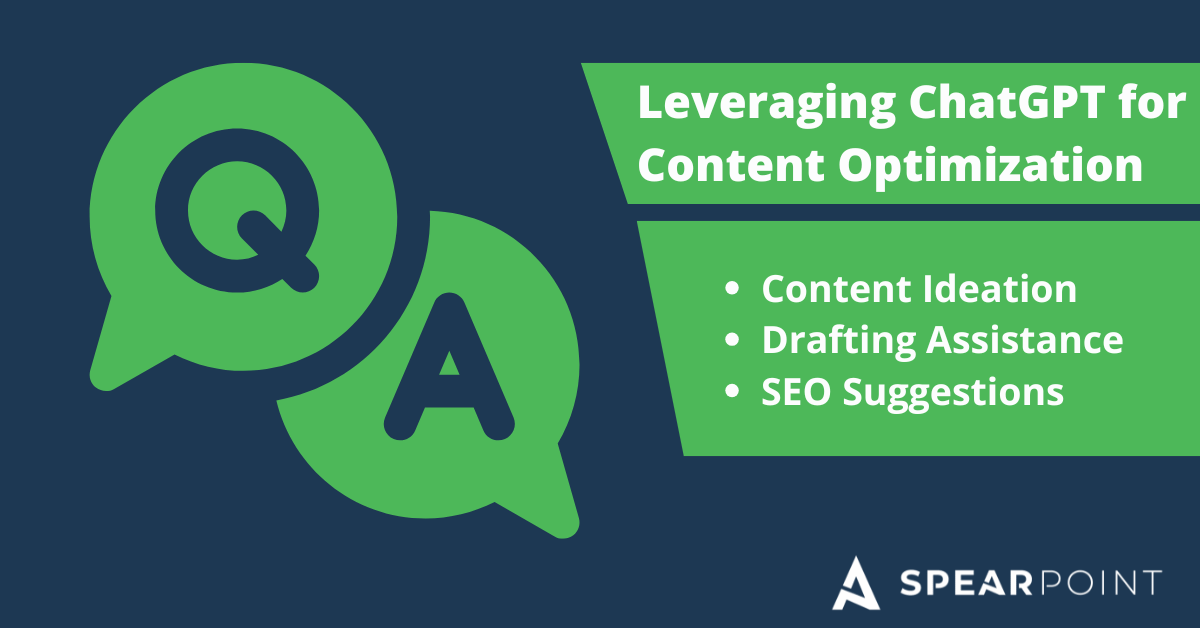How to Appear on ChatGPT: A Guide to AI-Driven Visibility
The way users discover information online is evolving rapidly. With AI tools like ChatGPT stepping into the spotlight, content consumption is shifting from link-heavy search results to seamless, conversational answers. For businesses, this means adapting strategies to ensure their content isn’t just indexed but intelligently surfaced in AI-driven responses.
At SpearPoint Marketing, we've been at the forefront of adapting to these changes. Building upon our previous discussion onLLMO vs SEO, this guide delves deeper into strategies to enhance your content's visibility on ChatGPT.
Also Read:
5 Key Takeaways
LLMO is the New SEO Frontier
Optimizing for large language models like ChatGPT requires structured, semantically clear content that’s easy for AI to interpret and reference.
Cite High-Authority Sources
AI models prioritize content linked to trusted domains. Use well-known, reputable citations to boost credibility and visibility.
Schema Markup Matters
Adding structured data (like FAQ or Article schema) improves how AI understands and presents your content even in conversational formats.
Keep Content Fresh & Conversational
Regularly update your content and write in natural language to better match how users ask questions in tools like ChatGPT.
Track Referral Traffic from AI Tools
Use Google Analytics to monitor referral traffic specially from AI-enhanced browsers and chat tools to see if your optimization efforts are paying off.
TL;DR:
Want your content to show up in ChatGPT responses? You’ll need more than traditional SEO. This guide covers how to optimize for AI-driven platforms by focusing on trust, structure, authority, and clarity. Learn how to use Large Language Model Optimization (LLMO), cite credible sources, and track referral traffic to improve your chances of being featured in conversational AI results.
Understanding ChatGPT's Information Retrieval
Before diving into optimization techniques, it's crucial to comprehend how ChatGPT sources its information:
Training Data: ChatGPT is trained on a diverse range of internet text, including websites, books, and articles. However, it doesn't know specifics about which documents were part of its training set.
Browsing Capability: With browsing enabled, ChatGPT can access current web content, expanding its ability to provide up-to-date information.
Citations: In some cases, ChatGPT provides citations or links to sources, especially when using plugins or browsing mode.
Understanding these mechanisms highlights the importance of having authoritative, well-structured, and up-to-date content to increase the likelihood of being referenced.
Build Trust with High-Authority Citations
If you want your brand to be referenced by AI tools like ChatGPT, building trust is non-negotiable. AI prioritizes credible, authoritative sources so when your content cites well-known and frequently referenced domains, it increases your chances of being featured.
Use tools that measure Domain Authority or Domain Trust (like Moz, Ahrefs, or SEMrush) to assess your site’s reputation and guide your SEO strategy. Incorporating trusted citations not only improves your content’s value but also signals to AI models that your material aligns with widely accepted knowledge.
“Add the more referenced or trusted the citation, then the more likely it will be feature”
Strategies to Enhance Visibility on ChatGPT
1. Embrace Large Language Model Optimization (LLMO)
Traditional SEO focuses on ranking in search engine results. LLMO, on the other hand, aims to make content easily digestible and referenceable by AI models.
Structured Content: Use clear headings, bullet points, and concise paragraphs. This structure aids AI in parsing and understanding your content.
Semantic Clarity: Ensure that your content conveys clear meanings, reducing ambiguity for AI interpretation.
Topic Clustering: Group related content together, creating comprehensive resources on specific subjects.
Reference: LLMO vs SEO: How to Optimize for AI Search Results
2. Produce High-Quality, Authoritative Content
AI models prioritize content that demonstrates expertise and trustworthiness.
Original Research: Publish studies or data analyses that provide unique insights.
Expert Opinions: Include quotes or perspectives from industry experts to bolster credibility.
Comprehensive Guides: Develop in-depth articles that thoroughly cover a topic, positioning your content as a go-to resource.
Insight: ChatGPT values content that is both informative and authoritative, increasing the chances of being cited in responses.
3. Implement Schema Markup
Schema markup helps search engines and AI models understand the context of your content.
Use Relevant Schemas: Apply schemas like Article, FAQ, or HowTo to structure your content effectively.
Enhance Snippets: Proper schema implementation can lead to rich snippets, making your content more appealing in search results and AI outputs.
Note: While schema markup doesn't guarantee inclusion in ChatGPT responses, it enhances content clarity for AI parsing.
4. Optimize for Conversational Queries
ChatGPT interacts in a conversational manner, so tailoring your content to match this style can be beneficial.
Natural Language: Write in a tone that mirrors how people speak, making it more relatable and easier for AI to process.
Answer Questions: Structure content to answer common questions in your industry, increasing the likelihood of being referenced in relevant queries.
Use FAQs: Incorporate Frequently Asked Questions sections to address specific concerns or topics.
Tip: Tools like ChatGPT can assist in identifying common questions related to your niche, guiding your content creation.
5. Maintain Up-to-Date Content
AI models favor current information, especially when browsing capabilities are enabled.
Regular Updates: Periodically review and update existing content to ensure accuracy and relevance.
Date Stamps: Clearly indicate when content was last updated, signaling freshness to both users and AI.
Monitor Trends: Stay informed about industry developments to provide timely insights.
Reminder: Outdated content may be overlooked by AI models in favor of more recent sources.
6. Enhance Site Accessibility and Performance
A well-structured and fast-loading website improves user experience and AI crawlability.
Mobile Optimization: Ensure your site is responsive and functions seamlessly across devices.
Page Speed: Optimize images and code to reduce loading times.
Clear Navigation: Implement intuitive menus and internal linking to facilitate content discovery.
Observation: Efficient site architecture aids AI in indexing and understanding your content hierarchy.
7. Build High-Quality Backlinks
Backlinks from reputable sources signal authority and trustworthiness.
Guest Posting: Contribute articles to respected industry publications.
Collaborations: Partner with influencers or organizations to co-create content.
Content Sharing: Promote your content across various platforms to increase visibility and potential backlinks.
Insight: While ChatGPT doesn't rely solely on backlinks, they contribute to overall content authority.
Leveraging ChatGPT for Content Optimization
Beyond aiming to appear in ChatGPT responses, you can utilize the tool to enhance your content strategy:
Content Ideation: Generate topic ideas based on trending queries or gaps in existing content.
Drafting Assistance: Use ChatGPT to create initial drafts, which can then be refined for quality and accuracy.
SEO Suggestions: Seek recommendations on keyword integration, meta descriptions, and title tags.
Example Prompt: "Provide an outline for a blog post on 'Emerging Trends in Digital Marketing' targeting B2B audiences."
Note: Always review and edit AI-generated content to ensure it aligns with your brand voice and factual accuracy.
Monitoring and Measuring Success
To assess the effectiveness of your efforts in optimizing for ChatGPT and AI visibility:
Analytics Tools: Use platforms like Google Analytics to track referral traffic specifically—this helps identify whether users are arriving via AI tools, third-party sources, or conversational platforms.
Search Console: Monitor how your content performs in traditional search results and identify opportunities for optimization, especially for long-tail and question-based queries.
Feedback Mechanisms: Encourage user feedback to gather insights into content clarity, relevance, and user satisfaction.
Pro Tip: Pay close attention to referral traffic sources in Google Analytics if traffic is coming from AI-enhanced browsers or tools like Perplexity or Bing Chat, it’s a sign that your content is being surfaced in conversational interfaces.
Conclusion
As AI continues to reshape the digital landscape, adapting your content strategy to align with tools like ChatGPT is essential. By focusing on clarity, authority, and user-centric content, you enhance the likelihood of your brand being featured in AI-generated responses.
At SpearPoint Marketing, we're committed to helping businesses navigate these changes, ensuring your content not only reaches your audience but also resonates with AI platforms. Embrace these strategies to stay ahead in the evolving world of digital marketing.
FAQs
What is SEO for ChatGPT?
SEO for ChatGPT refers to optimizing your content so it can be surfaced in conversational answers generated by AI models like ChatGPT. It focuses on clarity, trust, and authority to increase your chances of being cited in AI-driven responses.
How does ChatGPT find and use content from websites?
ChatGPT is trained on publicly available internet data and, when browsing is enabled, can access live content from websites. It looks for trustworthy, well-structured, and informative content. Including authoritative citations, schema markup, and natural language helps increase visibility.
Can I make my website appear in ChatGPT answers?
While you can’t “submit” your site directly to ChatGPT, you can improve your chances by:
Creating authoritative, original content
Citing trusted sources
Using clear formatting and schema markup
Updating content regularly
Building backlinks and site authority
What is the difference between SEO and LLMO?
SEO (Search Engine Optimization) targets ranking in traditional search engines like Google.
LLMO (Large Language Model Optimization) focuses on structuring and writing content that is easily understood and referenced by AI models like ChatGPT. LLMO emphasizes clarity, semantic structure, and authoritative value over keyword stuffing.
Does domain authority affect whether ChatGPT references my content?
Yes. ChatGPT tends to prioritize high-authority websites in its responses. The more trusted and frequently cited your domain is across the web, the more likely AI tools are to reference your content. Tools like Moz or Ahrefs can help track and improve your authority score.
Should I use FAQ and HowTo schema for AI visibility?
Absolutely. Schema markup helps AI models understand your content structure. Implementing FAQ, Article, and HowTo schemas can increase your content’s chances of being cited or linked in AI-generated answers.
What role do backlinks play in SEO for ChatGPT?
Backlinks still matter. While ChatGPT doesn’t rely solely on backlinks like traditional search engines, they contribute to your content’s overall authority. More high-quality backlinks = greater trust = better chance of being referenced.
About the Author
Jasmin Arenas
SEO & Content Marketing Intern at SpearPoint Marketing, Jasmin is diving deep into the evolving world of digital strategy where AI meets SEO. With a passion for writing, search trends, and learning what drives visibility, she supports brands as they navigate content in the age of ChatGPT and beyond.





